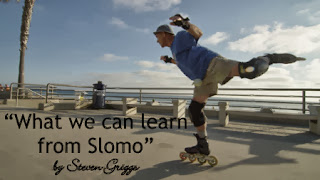No Limits | The Freedom Blog™
What We Can Learn From Slomo
Written by Steven Griggs | stevengriggs.com
"The Zone is all that is pure subjectivity. The Zone is composed entirely of subjectivity. Subjectivity is the part of the human experience that exists as happening right now to one's self"
Slomo
"It goes without saying there was one Zone before Hinduism, Buddhism, Judaism and Christianity. Any disagreement among religions about the nature of the Zone is over some matter that stems from outside the zone and is simply irrelevant to the discussion"
Slomo
Slomo lives in Pacific Beach in San Diego, "PB" if you have ever lived in San Diego. Slomo is a legend in PB.
I discovered him through a film I saw about him and his philosophy at the Palm Springs International Shortfest last week. Check him out online: www.Iamslomo.com
He is an in-line skater and has a very unique style. He has perfected a very graceful glide. On one foot. And he does it for an extremely long time. When he does it he looks like he is in slow motion, hence the nick name"Slomo".
But Slomo is much more than a graceful, slow motion skater, he is a very spiritual man. He has discovered a way to stay, as he describes it "in the zone" while he skates and probably when he's not.
This is man who has found his bliss. He left a very lucrative career as a doctor approximately 15 years ago. He left behind all his cars, Ferraris, a beautiful home on a hill. He had all the money and the perks. But it felt empty.
So empty that he left it all behind. He now lives in his studio apartment in PB and skates everyday. He exudes love and understanding. At first he wondered that maybe he had a mental problem, that maybe something was wrong with him. But he watched and observed himself and realized about a year later that this was real. He was ok and he was moving towards his bliss.
Slomo see the world as two zones. The Zone and the Non-Zone. The Non-Zone is the normal world , the Tick Tock world of objectivity. The world of the "Institutionalized man".
Who is the institutionalized man? We are. This is who we would describe ourselves as if we were asked to define ourselves. We are the product of our culture. According to Slomo we are extracted from the Zone at a young age and pushed into the institutional, structured world. Where we are regimented and trained to conform.
Slomo believes that if our lives were divided into three stages, it would look like this:
From early childhood to about the age of 10 our life is dominated by the "fundamental man". This is us at our most connected to the Zone. Many people living in the bush and in the countryside in third world countries are still very connected to the zone. The more industrialized and modernized our culture is, the more dominant the institutionalized man.
For the next 50-60 years we exist wholly as an institutionalized man. Deep in the belief system of the ego mind and the material world.
Finally, toward the end of our lives we come back to our fundamental self, closer to the zone.
What is the Zone?
Slomo says the "only inhabitant of the zone is the fundamental man. That this inhabitant is ancient, non-human and sexless. He has many names, not the least of which are "Christ"and the "Buddha".
Slomo has it right. We are living in an artificial world, a world where we have subsumed real meaning for "things" and for position and power. We have created a world in which we have separated ourselves from our true selves in an effort to become more special and unique, which is ironic because you already are special and unique....
I recommend that you check out Slomo. You don't have to buy into everything he is saying, that is his truth. But I'll bet you'll learn some little thing from him.
Just seeing someone in their bliss is amazing. Watch yourself to see your reaction. You may see the "training" we've all received in action as it rises up to "protect" you from these kinds of people. It may cause you to think for a second that he is crazy and weird.... but is he? Not really, he is just one of those people who live "outside" our safe, little world.
I know most of us, probably 99.9%, could never step into the life Slomo has created but just seeing him and knowing that he has taken that step and is living it, is amazing.
Check him out.
www.stevengriggs.com





